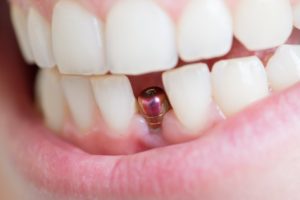 There’s a very good reason dentists often bring up dental implants as an excellent option to replace missing teeth; not only do they help keep the jawbone healthy, but they’re also durable and a great way to restore chewing power. However, there’s no such thing as a foolproof treatment; while implants have a very high success rate (90-95%), patients need to be aware of factors that can lead to failure. Here are 3 potential complications that can occur with dental implants in Boca Raton.
There’s a very good reason dentists often bring up dental implants as an excellent option to replace missing teeth; not only do they help keep the jawbone healthy, but they’re also durable and a great way to restore chewing power. However, there’s no such thing as a foolproof treatment; while implants have a very high success rate (90-95%), patients need to be aware of factors that can lead to failure. Here are 3 potential complications that can occur with dental implants in Boca Raton.
1. Osseointegration Failure
An implant is a metal post placed into the jawbone and topped with a crown. When the post is inserted, a process called osseointegration takes place, causing the metal to become joined with the bone. This allows the jaw to receive continued stimulation from chewing, which prevents bone loss and helps to maintain facial structure.
Sometimes, however, osseointegration may not take place as expected, leading to an early failure. This can be a result of low bone density; it can also be a result of uncontrolled diabetes or smoking affecting the healing process. This situation can often be resolved by removing the post and repairing the site with a bone graft. After it has healed, the dentist may attempt to place another implant.
2. Peri-Implantitis
While an implant itself can’t suffer from decay, the surrounding area is another story. Peri-implantitis is an infection that affects the gums at the implant site; it can eventually spread to the bone. Possible symptoms include discomfort and bleeding.
An infection can occur after surgery while the site is still healing; your dentist in Boca Raton may prescribe antibiotics to help reduce the risk. They may also suggest using an antibacterial mouthwash. Of course, regular brushing and flossing are always essential in keeping the gums healthy; make sure to use a soft-bristled toothbrush and non-abrasive toothpaste to avoid damaging the crown.
3. Prosthetic Complications
While implants are durable, they can still be damaged. Screws might become broken, abutments can come loose, or a fracture might occur. Repairs are often possible in these cases, and they’re usually easier to deal with than an infection.
You can protect your implants by being careful with them. Don’t bite down on ice, peppermints, or other hard foods. Avoid using your teeth to open bottles and other containers; you should always use a tool actually designed to do the job.
Don’t forget to speak with your dentist about any additional or specific care instructions they might have. By being vigilant against potential problems and keeping up with your regular dental appointments, you can reduce the chances of implant failure and continue to enjoy your new teeth for years to come!
About the Author
Dr. Steven Feit is a prosthodontic specialist who offers many different options for restoring broken and missing teeth, including implants that can support crowns, bridges or dentures. He has over 30 years of experience and is currently conducting research regarding the natural bite. To schedule an appointment, visit his practice’s website or call (561) 338-7535.